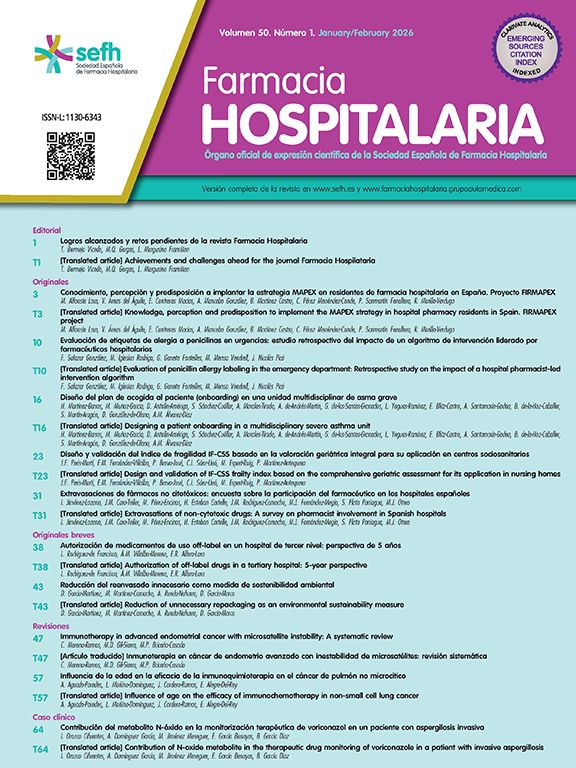
Nuevos roles y retos del farmacéutico de hospital. New roles and challenges of the hospital pharmacist
Más datosFor more than 50years, hospital pharmacists have been evolving in knowledge and skills to respond to the new needs and challenges faced by Hospital Pharmacy Services in their daily activity.
In 2008, a large panel of experts from the Spanish Society of Hospital Pharmacist (SEFH) defined the 2020 Project “Towards the future with safety”, that made it possible to establish the strategies for the transformation of Hospital Pharmacy Services, setting strategic objectives for their growth and the profession as well, in key aspects such as new technologies, patient safety, continuous pharmaceutical care, scientific evidence, teaching and research.
Once concluded, having analyzed the progress that this plan has allowed, and being aware that the path of hospital pharmacy has always been moving forward, innovating and facing new challenges (patients, society, research, environment, technology), it is necessary to continue tackling the new challenges and roles that hospital pharmacists must continue to undertake in the coming years.
For this reason, the SEFH's Project 2030, also drawn up by a large group of experts, will serve as a roadmap to achieve this goal.
This monographic issue of Farmacia Hospitalaria Journal focused on the New Roles and Challenges of the Hospital Pharmacist in Spain has been proposed by the Editorial Committee to address some of the issues that must be addressed in the short term in the hospital pharmacy services of our country.
This monograph is made up of an editorial, six special articles and a review, addressing some of the current hot topics.
From a of hospital pharmacy perspective, it addresses issues as the environmental contamination of medicines and the need to find solutions involving different agents and acting in all steps of the medicine's life cycle.
On the other hand, the enormous development of advanced therapy medicinal products, both industrial and investigational, in recent years is a challenge for hospital pharmacy at all levels. The participation of the pharmacy service in the academic production of these medicines is a challenge for pharmacy services.
The personalization of treatments has provided an impulse for the development of pharmacogenetics and pharmacogenomics in pharmacy services. This advance improves therapeutic individualization, helping to identify the most effective drug for the patient, while avoiding potential damage. Therefore, these disciplines will play a significant role in future drug development and decision-making in clinical practice. A narrative review of how these disciplines is being applied in the clinic, especially in Spain, is presented.
Another relevant aspect in pharmacy services is the growing research activity and therefore the need to standardize and promote said activity by developing a scorecard of 40 indicators that evaluate publications, human resources, research projects, doctoral theses and patents and intellectual property records, which allow the management and comparison of one's own activity or shared with other research groups, the necessary resources and the results of this research.
A current hot topic now is the use of artificial intelligence (AI). By mining large volumes of healthcare data, artificial intelligence algorithms can identify patterns and predict outcomes, which can help healthcare organizations and their professionals make better decisions and achieve improvement in outcomes. AI has found its way into biomedicine, speeding up processes, improving accuracy and efficiency and providing better patient care. Hospital pharmacists who máster AI will play a critical role in this transformation.
In the coming years, the training of hospital pharmacists must be adapted and respond to current and future social and technological challenges, without overseeing the basic areas of the profession. To this end, it is necessary to achieve knowledge in what is known as integral digital health: artificial intelligence, technology and automatization, digital skills and new forms of communication with patients, such as telemedicine and telepharmacy, which are already a reality in many hospitals. In this digital scenario, there are new risks and challenges to face, such as cybersecurity and cyber resilience, which makes the training and education of healthcare professionals in general, and hospital pharmacists in particular, essential.
Hospital pharmacy today is a profession marked by therapeutic advances, with a proactive attitude, focused on people and their health. The evolution of processes is constant, with full presence of digitalization, robotics and even artificial intelligence, in an environment that also requires the efficient and sustainable use of these tools. In this context, it is necessary to have a roadmap to guide the advancement of the profession and hospital pharmacy services.
In line with the 2020 Project initiative, the Spanish Society of Hospital Pharmacy has set out the challenges facing the profession today and with a view to 2030. With this strategic planning objective in mind, 20 challenges have been identified and developed, covering the different areas of activity and implication of hospital pharmacy and covering healthcare, transversal aspects, training and research, as well as areas related to people and the healthcare organizations or systems themselves. For each of these areas, objectives, standards, tools and resources have been defined. It is also foreseen to provide tools to facilitate the monitoring of implementation and the impact on the profession, patients and the environment.
We would like to thank all the authors for their magnificent work, without their help this monograph would not have been possible.








